By Akiko Higashimura | Published digitally by Kodansha Comics
 I spent all my time wondering “what if,” then one day I woke up and I was 33.
I spent all my time wondering “what if,” then one day I woke up and I was 33.
Thirty-something Rinko Kamata and her two best friends from high school, Kaori and Koyuki, are still single. They’ve happily spent the last decade getting together regularly for girls’ nights out, during which they get sloshed and speculate on what might’ve happened with past romances or how they might meet Mr. Right in the future. When it’s announced that Tokyo will be hosting the Olympics in 2020 and it dawns on the trio that they might still be single amidst all the celebrating, they abruptly realize that they might have missed their chance to snag husbands.
Ten years ago, Rinko had a chance with Mr. Hayasaka, a dull but sweet coworker, but rejected him. Their work—she’s a scriptwriter and he’s a producer for a television production company—still brings them together, however, and when she seemingly has a second chance, she considers accepting this time, wondering if women must choose being loved over being in love once they’re over thirty. Of course, she’s drunk at the time, so her thoughts are whimsically presented in the form of conversation with her snacks! Specifically, tara (milt) and reba (liver), whose names combine to mean “what if” and thus supply the pun of the series title. They’re cute little creatures, and tara especially gives me some Little Fluffy Gigolo PELU flashbacks (in the best way).
Of course, we wouldn’t have a series if things worked out with Mr. Hayasaka, and losing out to younger women in romance, work, and at a courtship party, where the “tarareba girls” discover that even schlubby guys their age have pretty young things competing for them (because the younger guys are all under- or unemployed), sends her somewhat off the rails, hopping in a taxi to capture some blackmail evidence and winding up at a hot springs resort, drinking alone and feeling unwanted until Key, a snarky male model who’s observed the rowdy trio at their favorite pub and was critical of Rinko’s writing—essentially unrealistic wish-fulfillment fare for daydreaming middle-aged women—shows up to forestall disaster and ends up proving himself to be the ultimate “what if” scenario that Rinko hadn’t even considered. Plus, he encourages her to see her recent failures as a chance instead of a setback, and I hope this means we’ll see her write what she claims she really wants to write and achieve success after all.
This is quite a madcap volume, what with the talking food, and there are also several quick cuts to Rinko guzzling alcohol that make me think this would be extremely amusing in either animated or live-action format. I also really like the way we her conversations with friends via text are depicted. Ordinarily, I might be bothered that these ladies are so fixated on husbands, but Higashimura-sensei has some author’s notes at the back wherein she makes it absolutely clear that she does not think that marriage is the key to happiness or that it’s a requirement for women. It’s just that she had some friends who were beginning to experience some of these things, and she decided to write about them.
Before Kodansha’s announcement, this series hadn’t even been on my radar, so in addition to being grateful for more josei in any format, I’m especially glad to be introduced to this fun story. I’m looking forward to volume two!
Tokyo Tarareba Girls is ongoing in Japan where it is up to seven volumes.
Review copy provided by the publisher.

 Chihayafuru is a long-running josei sports manga series about a girl who discovers a passion for the Japanese card game,
Chihayafuru is a long-running josei sports manga series about a girl who discovers a passion for the Japanese card game,  In the opening scene of Wave, Listen to Me! we meet Minare Koda, an attractive twenty-something drinking too much and pouring her heart out to a guy she just met forty minutes prior. She’s ranting about her ex, Mitsuo, and after a certain point, she has no recollection of events. To her surprise, when she’s at work the next day (as a waitress in a curry shop), she hears her own voice being played over the radio. Turns out, the guy she met was Kanetsugu Mato, who works for a radio station and recorded their conversation. (One of the things she’d forgotten was drunkenly giving her consent.) Minare is temperamental and feisty, so when she marches down to the station to give him a piece of her mind, she ends up going live on the air and impressing Mato with her facility for impromptu eloquence.
In the opening scene of Wave, Listen to Me! we meet Minare Koda, an attractive twenty-something drinking too much and pouring her heart out to a guy she just met forty minutes prior. She’s ranting about her ex, Mitsuo, and after a certain point, she has no recollection of events. To her surprise, when she’s at work the next day (as a waitress in a curry shop), she hears her own voice being played over the radio. Turns out, the guy she met was Kanetsugu Mato, who works for a radio station and recorded their conversation. (One of the things she’d forgotten was drunkenly giving her consent.) Minare is temperamental and feisty, so when she marches down to the station to give him a piece of her mind, she ends up going live on the air and impressing Mato with her facility for impromptu eloquence. Volume two is where things really get great. Mato has inventive ideas for Minare’s show, and I think I will let readers discover those for themselves. What I really loved, though, was the continued exploration of Minare’s personality. For example, when she has the jitters and receives reassurance, she cries, “I can feel it rushing back! My usual baseless, overflowing confidence!” She might have come off as an unsympathetic and abrasive character, but that line shows that she’s fully aware of her flaws. Later, after a brief (and awesome) reunion with Mitsuo, she displays a knack for more self-analysis, reflecting that while she usually doesn’t take shit from anyone, she has a certain weakness for pathetic guys who need someone to dote over them. I expect that this capacity for reflection will allow her to make the most of the opportunity she’s been given.
Volume two is where things really get great. Mato has inventive ideas for Minare’s show, and I think I will let readers discover those for themselves. What I really loved, though, was the continued exploration of Minare’s personality. For example, when she has the jitters and receives reassurance, she cries, “I can feel it rushing back! My usual baseless, overflowing confidence!” She might have come off as an unsympathetic and abrasive character, but that line shows that she’s fully aware of her flaws. Later, after a brief (and awesome) reunion with Mitsuo, she displays a knack for more self-analysis, reflecting that while she usually doesn’t take shit from anyone, she has a certain weakness for pathetic guys who need someone to dote over them. I expect that this capacity for reflection will allow her to make the most of the opportunity she’s been given.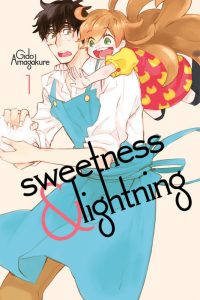 Widowed math teacher Kohei Inuzuka wants to do his best when it comes to raising his daughter, Tsumugi. It’s been six months since his wife passed away, and because he has never had much of an appetite and hasn’t fared well with cooking in the past, he mostly relies on store-bought fare for Tsumugi. However, after they run into one of his students, Kotori Iida, while looking at cherry blossoms, he can’t help but notice how fascinated Tsumugi is by the home-cooked lunch Kotori’s been eating. To make his daughter happy, he ends up taking her to Kotori’s family restaurant, which leads to regular dinner parties where they experiment with making different things together.
Widowed math teacher Kohei Inuzuka wants to do his best when it comes to raising his daughter, Tsumugi. It’s been six months since his wife passed away, and because he has never had much of an appetite and hasn’t fared well with cooking in the past, he mostly relies on store-bought fare for Tsumugi. However, after they run into one of his students, Kotori Iida, while looking at cherry blossoms, he can’t help but notice how fascinated Tsumugi is by the home-cooked lunch Kotori’s been eating. To make his daughter happy, he ends up taking her to Kotori’s family restaurant, which leads to regular dinner parties where they experiment with making different things together.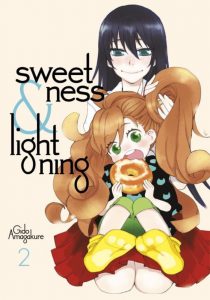 chawanmushi, and some seriously drool-inducing gyoza. Recipes are included, and for the first time, I feel like they’re actually something I might attempt.
chawanmushi, and some seriously drool-inducing gyoza. Recipes are included, and for the first time, I feel like they’re actually something I might attempt.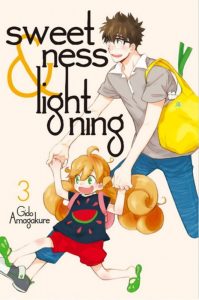 He and Kotori maintain their distance at school, and he frequently worries about inconveniencing her mother. And yet, the gatherings make Tsumugi so happy—and even lift her spirits when she begins to truly comprehend the permanence of her mother’s absence—that he gratefully accepts the Iidas’ hospitality. He behaves professionally at all times. Kotori, however, seems to be developing feelings for him, though it’s all mixed up as she sees him as both a guy and as a father figure. I wouldn’t be surprised if the manga ends with them getting married, but I hope nothing romantic ensues for a very long time.
He and Kotori maintain their distance at school, and he frequently worries about inconveniencing her mother. And yet, the gatherings make Tsumugi so happy—and even lift her spirits when she begins to truly comprehend the permanence of her mother’s absence—that he gratefully accepts the Iidas’ hospitality. He behaves professionally at all times. Kotori, however, seems to be developing feelings for him, though it’s all mixed up as she sees him as both a guy and as a father figure. I wouldn’t be surprised if the manga ends with them getting married, but I hope nothing romantic ensues for a very long time. My name is Saitama. I am a hero. My hobby is heroic exploits. I got too strong. And that makes me sad. I can defeat any enemy with one blow. I lost my hair. And I lost all feeling. I want to feel the rush of battle. I would like to meet an incredibly strong enemy. And I would like to defeat it with one blow. That’s because I am One-Punch Man.
My name is Saitama. I am a hero. My hobby is heroic exploits. I got too strong. And that makes me sad. I can defeat any enemy with one blow. I lost my hair. And I lost all feeling. I want to feel the rush of battle. I would like to meet an incredibly strong enemy. And I would like to defeat it with one blow. That’s because I am One-Punch Man.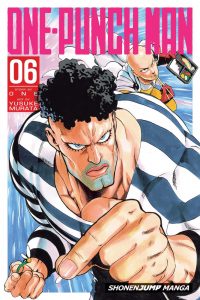 The balancing act ONE and Murata achieve here is impressive. On the one hand, One-Punch Man is gloriously silly. Heroes and foes alike are apt to be ludicrous, and some of the former have terrific names like Tank Top Vegetarian or Spring Mustachio (although I actually think he’s pretty cool). On the other hand, there is a lot of excellent shounen manga storytelling going on. The way Saitama lives his life without criticism for others makes me think he’d get along well with One Piece‘s Luffy, and the devotion his pupil Genos shows for him means they can always rely on each other. Too, after Saitama joins the Hero Association, we get regular updates on how his rank is improving, and this puts him in contact with even more heroes, some of whom are inept, some of whom are capable, and one of whom might actually be an enemy. He doesn’t seek glory, so many are unaware of his true strength, but I assume that eventually he will attain the rank he deserves (currently, due to poor performance on the written test, he’s far below Genos).
The balancing act ONE and Murata achieve here is impressive. On the one hand, One-Punch Man is gloriously silly. Heroes and foes alike are apt to be ludicrous, and some of the former have terrific names like Tank Top Vegetarian or Spring Mustachio (although I actually think he’s pretty cool). On the other hand, there is a lot of excellent shounen manga storytelling going on. The way Saitama lives his life without criticism for others makes me think he’d get along well with One Piece‘s Luffy, and the devotion his pupil Genos shows for him means they can always rely on each other. Too, after Saitama joins the Hero Association, we get regular updates on how his rank is improving, and this puts him in contact with even more heroes, some of whom are inept, some of whom are capable, and one of whom might actually be an enemy. He doesn’t seek glory, so many are unaware of his true strength, but I assume that eventually he will attain the rank he deserves (currently, due to poor performance on the written test, he’s far below Genos). As of volume eleven, there are several plotlines in play. Monsters are appearing everywhere, and appear to be organizing. Is this tied in with the prediction of an extinction-level event within the next six months? What about that hint of a possible traitor that was dropped a few volumes back? While a rogue martial artist named Garo is hunting heroes, Saitama is off at a martial arts tournament to learn more how to defeat Garo (not knowing that he totally already did) and seems destined to face off against another strong fighter who is desperate for a challenge. I admire how this story has widened in scope in a natural way, without compromising the balance of narrative and humor. It could conceivably go on for a very long time, and I deeply hope it does.
As of volume eleven, there are several plotlines in play. Monsters are appearing everywhere, and appear to be organizing. Is this tied in with the prediction of an extinction-level event within the next six months? What about that hint of a possible traitor that was dropped a few volumes back? While a rogue martial artist named Garo is hunting heroes, Saitama is off at a martial arts tournament to learn more how to defeat Garo (not knowing that he totally already did) and seems destined to face off against another strong fighter who is desperate for a challenge. I admire how this story has widened in scope in a natural way, without compromising the balance of narrative and humor. It could conceivably go on for a very long time, and I deeply hope it does. I admit that I initially judged this book by its cover, assuming that it was on the smutty side and aimed at a decidedly male audience. While it is true that Scum’s Wish is seinen, the mangaka (Mengo Yokoyari) is female, and the end result (for me, at least) feels more like dark shoujo.
I admit that I initially judged this book by its cover, assuming that it was on the smutty side and aimed at a decidedly male audience. While it is true that Scum’s Wish is seinen, the mangaka (Mengo Yokoyari) is female, and the end result (for me, at least) feels more like dark shoujo.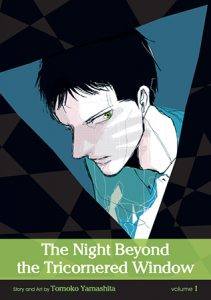 Until Olivia mentioned it over in the
Until Olivia mentioned it over in the 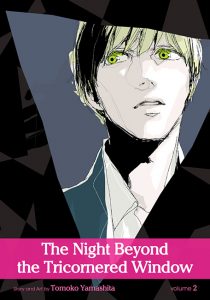 I love series like this, where the leads have episodic disturbances that they investigate (via the partnership they strike up as a sort of supernatural cleaning crew and frequently assisting a non-believing cop named Hanzawa) plus an ongoing mystery (involving curses cast by someone named Erika Hiura) and yet the most important and fascinating aspect is the relationship between the leads themselves. There are the fun, suggestive moments where the guys are combining their powers for one reason or another and end up using dialogue like, “Do you want me to touch it?” or “Take me all the way in.” But where Yamashita-sensei really excels is at teasing out threads of darkness.
I love series like this, where the leads have episodic disturbances that they investigate (via the partnership they strike up as a sort of supernatural cleaning crew and frequently assisting a non-believing cop named Hanzawa) plus an ongoing mystery (involving curses cast by someone named Erika Hiura) and yet the most important and fascinating aspect is the relationship between the leads themselves. There are the fun, suggestive moments where the guys are combining their powers for one reason or another and end up using dialogue like, “Do you want me to touch it?” or “Take me all the way in.” But where Yamashita-sensei really excels is at teasing out threads of darkness.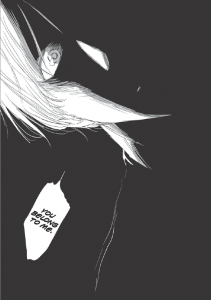
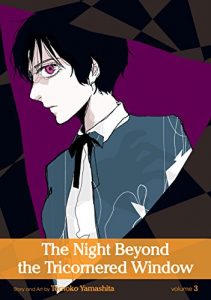 It’s only at the end of volume three, wherein Hiyakawa nonchalantly suggests that it’d be good if they could work the other side of the business, too, that Mikado realizes he has no idea what kind of person he’s working with. As a reader, I too was lulled into believing that of course the protagonist of a series about fighting the supernatural is a good guy. Turns out, he’s more of an empty-inside opportunist. At this point, even I just want to say, “Run away, Mikado! Run away and don’t look back!” Is there any hope that he can help heal and humanize Hiyakawa, or will he only end up destroyed? How soon until volume four comes out?!
It’s only at the end of volume three, wherein Hiyakawa nonchalantly suggests that it’d be good if they could work the other side of the business, too, that Mikado realizes he has no idea what kind of person he’s working with. As a reader, I too was lulled into believing that of course the protagonist of a series about fighting the supernatural is a good guy. Turns out, he’s more of an empty-inside opportunist. At this point, even I just want to say, “Run away, Mikado! Run away and don’t look back!” Is there any hope that he can help heal and humanize Hiyakawa, or will he only end up destroyed? How soon until volume four comes out?!
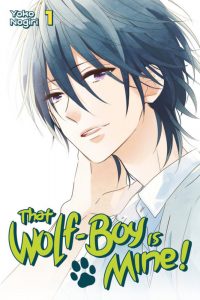 After making a social blunder at school that results in being shunned by her female classmates, Komugi Kusunoki is glad of the chance to start over in Hokkaido when the demands of her mother’s job mean Komugi will need to live with her father instead. At Maruyama High School, she quickly befriends a couple of nice girls (Kana and Keiko) and learns about the small clique of hotties over whom many girls swoon but who keep to themselves. One day, she surprises one of the boys (Yu Ogami) while he is napping and he turns into a wolf who promptly boops her on the nose.
After making a social blunder at school that results in being shunned by her female classmates, Komugi Kusunoki is glad of the chance to start over in Hokkaido when the demands of her mother’s job mean Komugi will need to live with her father instead. At Maruyama High School, she quickly befriends a couple of nice girls (Kana and Keiko) and learns about the small clique of hotties over whom many girls swoon but who keep to themselves. One day, she surprises one of the boys (Yu Ogami) while he is napping and he turns into a wolf who promptly boops her on the nose.  As Komugi gets to know them better, she learns that Ogami is half human and was abandoned in the woods by his human mother. Although he doesn’t hate humans as Fushimi claims to do, and is in fact kind and sweet, he’s still determined that he is going to be the last of his line and that he won’t fall in love with anyone, which is a problem because it doesn’t take long for Komugi to fall for him. Meanwhile, Fushimi witnesses this happening and tries to spare her hurt, and when she’s later trying to acclimate to just being friends with Ogami, he’s the one who’s there for her to talk to, sparking some jealous feelings on Ogami’s part.
As Komugi gets to know them better, she learns that Ogami is half human and was abandoned in the woods by his human mother. Although he doesn’t hate humans as Fushimi claims to do, and is in fact kind and sweet, he’s still determined that he is going to be the last of his line and that he won’t fall in love with anyone, which is a problem because it doesn’t take long for Komugi to fall for him. Meanwhile, Fushimi witnesses this happening and tries to spare her hurt, and when she’s later trying to acclimate to just being friends with Ogami, he’s the one who’s there for her to talk to, sparking some jealous feelings on Ogami’s part.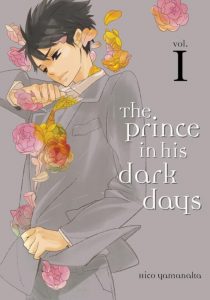 Seventeen-year-old Atsuko is desperate for cash. Her father is an ungrateful drunk, they’re so poor that she’s mocked by classmates for her lack of personal hygiene, and she has resorted to fleecing perverted old men just so she can eat. Shortly after a chance meeting in which she runs into her male doppelganger, Itaru, she is kidnapped by his rich friend, Ryo Sekiuchi, and hired to impersonate Itaru (who has gone missing) for one million yen. Atsuko agrees and tutoring commences. She meets some nice people who are concerned for her welfare and appreciative of her effort, which is something she hasn’t experienced before, and learns that happiness isn’t automatic, even if you live in a huge, beautiful mansion.
Seventeen-year-old Atsuko is desperate for cash. Her father is an ungrateful drunk, they’re so poor that she’s mocked by classmates for her lack of personal hygiene, and she has resorted to fleecing perverted old men just so she can eat. Shortly after a chance meeting in which she runs into her male doppelganger, Itaru, she is kidnapped by his rich friend, Ryo Sekiuchi, and hired to impersonate Itaru (who has gone missing) for one million yen. Atsuko agrees and tutoring commences. She meets some nice people who are concerned for her welfare and appreciative of her effort, which is something she hasn’t experienced before, and learns that happiness isn’t automatic, even if you live in a huge, beautiful mansion.


Recent Comments